Tesqopa
Tesqopa (Syriac: ܬܠܐ ܙܩܝܦܐ, Arabic: تسقوبا) or Tel Skuf (Syriac: ܬܠ ܣܩܘܦ, Arabic: تللسقف), also Tel Eskof or Tall Asqaf[2] is a town in northern Iraq located approximately 19 miles (about 28 kilometres) north of Mosul. The town is populated by Assyrians and they are members of the Chaldean Catholic Church.[3]
Tesqopa
ܬܠܐ ܙܩܝܦܐ تسقوبا | |
|---|---|
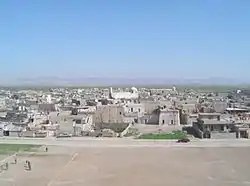 | |
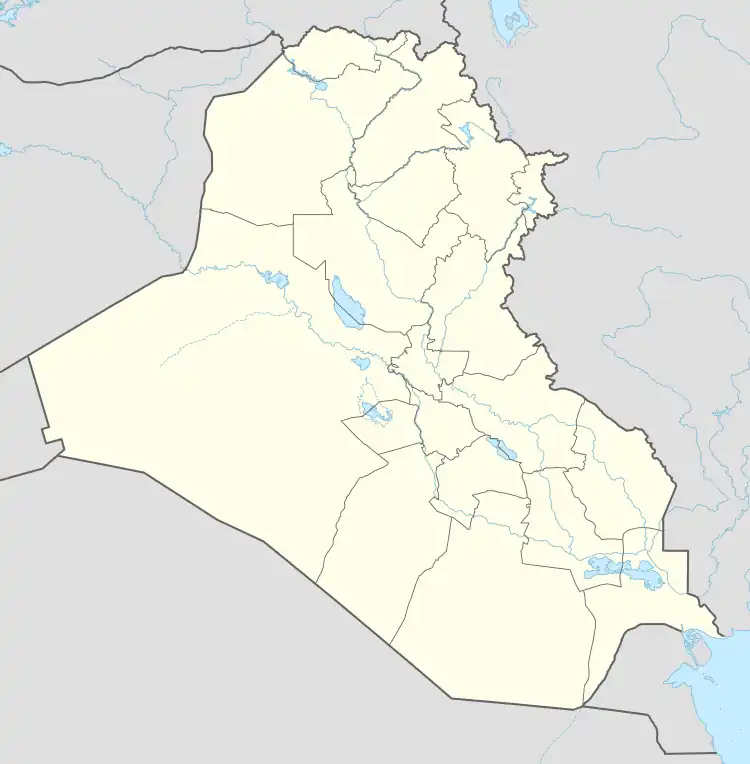 Tesqopa | |
| Coordinates: 36°35′50.72″N 43°6′13.40″E | |
| Country | |
| Governorate | Nineveh |
| District | Tel Kaif |
| Population (2020)[1] | |
| • Total | 4,185 |
| Time zone | GMT +3 |
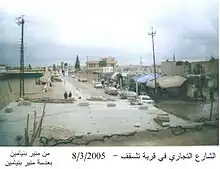
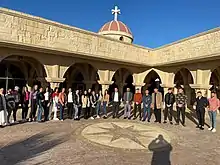
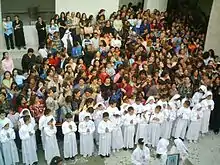
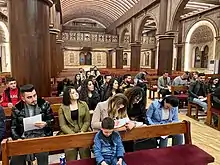
The town was captured by ISIS briefly in August 2014 but was recaptured by Kurdish Peshmerga in August 2016.[4]
Many of the residents of the town returned with aid from the Hungary,[5] while a large portion has migrated to Europe.[3]
Early history
Tesqopa is not mentioned in Thomas of Marga's Book of Governors (c. 840) or any of the other early monastic histories of the Church of the East, and may well have been founded as late as the Seljuq period, perhaps in the eleventh century. It is first mentioned as a Christian village in a thirteenth-century poem by the Assyrian writer Giwargis Warda. This poem describes its sack by a raiding band of Mongols in November 1235 and the destruction of its church of Mar Yaʿqob the Recluse.[6]
Tesqopa was subject to many attacks by the Mongols, the worst among them was the massacre of 1436 when they attacked the town, killing thousands of its Assyrian inhabitants and burning its crops and churches, ultimately forcing the rest of the inhabitants to flee to the mountains. In 1508 Tesqopa was attacked again by the Mongols, just as they attacked Tel Keppe, Alqosh and the Monastery of Rabban Hormizd. Tesqopa was also attacked by the army of Nader Shah in 1743 during his march on Mosul.
Modern history
The town received many Assyrian refugees from Baghdad and Mosul in the wake of the sectarian violence in the 2000s. On 23 April 2007 a car bomb that targeted the village resulted in more than 25 deaths.[7]
In early August 2014, Islamic State of Iraq and Syria (ISIS) entered Tesqopa. But on 17 August 2014 the Kurdish Peshmerga retook Tesqopa.[4] After this, the local Christian Assyrians were then able to restore the crosses atop their vandalized churches.[8]
ISIL militants overran the town during dawn on 3 May 2016 however they were driven out of the town by Peshmerga fighters later in the day.[9] By 2017, several hundred families had returned to the town and the parish church was functioning again. The Hungarian government assisted in rebuilding the destroyed homes of 991 Christian families.[10]
References
- "The Struggle to Exist: An Introduction to the Assyrians and their Human Rights Situation in the New Iraq" (PDF). www.atour.com. Assyria Council of Europe.
- "تللسقف) تسقوبا)". Ishar TV (in Arabic). Retrieved 8 November 2020.
- "Region in focus - Iraqi ghost town used as base to fight ISIL". Ishtar TV. 6 November 2015. Retrieved 8 November 2020.
- Abdullah, Dalshad (18 August 2014). "Peshmerga retake Mosul Dam: spokesmen". Asharq al-Awsat. Retrieved 30 October 2022.
- "Teleskuf, the rebirth of an Iraqi village". Foundation for Relief and Reconciliation in the Middle East. 2018-07-13. Retrieved 2019-07-17.
- Wilmshurst, EOCE, 202 and 234
- استشهاد أكثر من خمس وعشرين شخصا في انفجار تللسقف. Zahrira (in Arabic). 23 April 2012. Archived from the original on 1 February 2014. Retrieved 11 April 2012.
- "Pictures Show Aftermath of ISIS Looting, Plundering Assyrian Town". AINA News. 21 August 2014. Retrieved 30 October 2022.
- "US Navy Seal killed in Iraq as IS breaches Peshmerga lines". BBC News. BBC. 4 May 2016. Retrieved 30 October 2022.
- Ádám, Forisek (29 July 2018). "Már számadatok is bizonyítják: Nyugat-Európát nem érdeklik az üldözött keresztények". 888.hu. Retrieved 30 October 2022.
